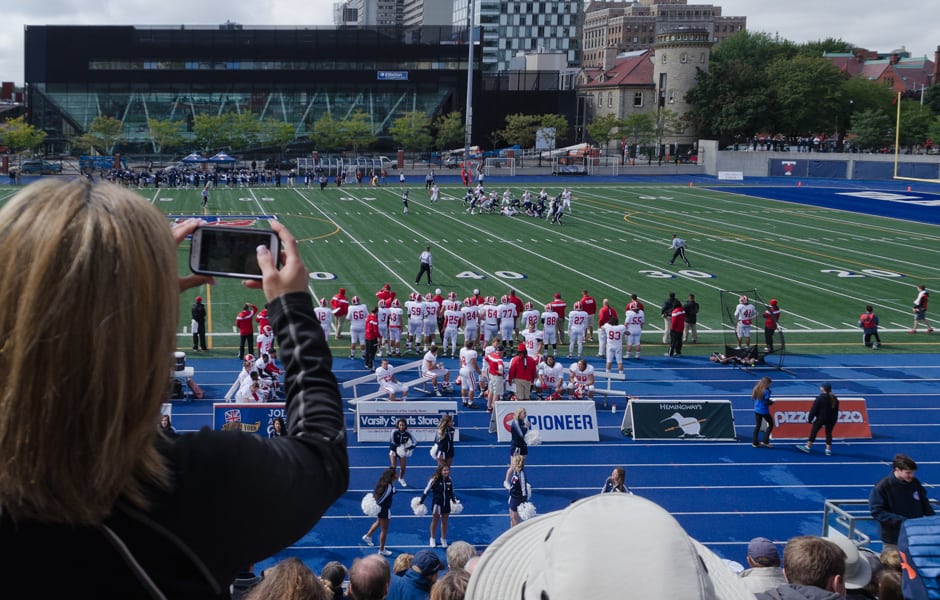The St. George Round Table (SGRT) is saying that the decision to work with the University of Toronto Students’ Union (UTSU) should not necessarily be seen as a sign of future collaboration.
After voting to organize a homecoming party independent of the UTSU, SGRT eventually made the decision to partner with the union.
The SGRT, an organization composed of the elected heads of the divisional societies on the St. George campus, abandoned their plans for an alternative homecoming party without the UTSU despite having already begun work on it.
The UTSU did not respond to requests for comment on this story.
This year, all SGRT student leaders were invited to sit in on the UTSU’s Homecoming Committee meeting. Though the invitation initially fostered dialogue between the SGRT and the UTSU, the SGRT began to find that they were displeased with the planning process. Initially dismissing these meetings as unfocused and unproductive, the SGRT abandoned the idea of a collaborative homecoming in favour of pursuing an independent homecoming party without formal cooperation from the UTSU.
Last year’s homecoming was fraught with disputes. Citing a history of disagreement between the colleges and the UTSU, Trinity College and the University of Toronto Engineering Society (EngSoc) declined to take part in the event, which they claimed intentionally undermined and ignored the divisional societies.
This year, despite previous disagreements, the UTSU and the SGRT found themselves working together. Rowan DeBues, president of the Victoria University Students’ Administrative Council (VUSAC), said that, while many colleges stepped up to plan an alternative college-led homecoming, the process was not ideal.
DeBues said that issues of organization and planning prompted the decision to work with the UTSU after all. DeBues added that the decision was not so much about fostering collaboration, and was more a product of concerns for expedience. “It was never about not doing the tailgate without the UTSU. It was that the planning for the tailgate was not looking promising,” he said.
Other student societies with a history of tension with the UTSU were similarly displeased with the return to the plan for a joint event. However, they generally found the collaborative atmosphere and its greater college representation to be effective when incorporating their divisional perspectives.
Connor Anear, Kaleem Hawa, and Tina Saban, student leaders at Trinity, said that their change of mind came about due to changes in attitude and structure on the part of the UTSU. “It’s clear that our efforts translated into positive change: homecoming had no hierarchy or ulterior political motive,” they said in a joint statement, adding: “The SGRT met with the UTSU executives who assured us that they desired a U of T homecoming rather than a UTSU homecoming.”
On Thursday, Anear, Hawa, and Saban submitted a letter to the executive members of the UTSU that expressed concerns over recent discussions on online voting, and the potential reduction or elimination of college and professional faculty representation on the union’s Board of Directors.
In the letter, the Trinity College Meeting (TCM) called on the UTSU to “improve the online voting system to address any technical issues that may exist with the current online voting system rather than eliminating the system.” The TCM also asked that the UTSU “support a proposal for its Board of Directors structure that maintains colleges’ and professional faculties’ respective representation, power, and voting rights on the Board.”
Despite the homecoming collaboration, the Trinity College leaders said that the move is not necessarily indicative of future collaboration. “Strong relations can only come about through a concerted good-faith effort on the part of the UTSU not to remove online voting in the upcoming election and to maintain elected college and professional faculty positions on its Board of Directors,” they said.
Similarly, EngSoc president Teresa Nguyen expressed disinterest at the prospect of further cooperation with the USTU. EngSoc was not involved in the event’s organization, she said, as it conflicted with an EngSoc event. Nguyen cautioned against misreading it as an across-the-board approval of the union’s relationship with the divisional societies. “The decision was made by [the] SGRT because homecoming was a chance to bring the campus together at an exciting time of the year, not about anything else,” she said.
Nguyen attributed the difficulties in communication and cooperation to what EngSoc considers the UTSU’s shortcomings in areas of transparency and fairness. “Our priority conversation in our external affairs at this point in time is with the office of the Vice-Provost pertaining to the [Student Societies] Summit report released by the university this past April,” said Nguyen.


